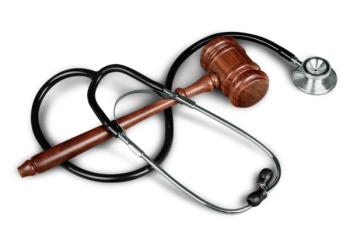
COVID-19 Vaccines and Liability: What your medical practice needs to know
Despite the PREP Act’s broad immunity coverage, plaintiffs’ attorneys have already been filing complaints in many jurisdictions.
By early May, about
As the long lines of patients seeking a life-saving vaccine begin to shorten, the physicians, nurses, pharmacists, medical technicians, and other health care professionals who have been working tirelessly to administer all those shots in the arm are bracing for a new threat: liability lawsuits.
Most of the risk of medical malpractice litigation related to COVID-19 vaccines comes from the possibility that staff did not follow their own best practices, and this risk can be greatly reduced by meticulous adherence to procedures.
Here are a few things your medical practice needs to know and prepare for as the public health campaign to quickly administer COVID-19 vaccines spurs a wave of litigation.
Who is Covered Under the PREP Act?
The
There have been several amendments to the PREP Act to expand the list of professionals who are qualified to administer the vaccine as part of the public health push to get more people vaccinated quickly. In addition to physicians, physicians’ assistants, nurses, and emergency medical technicians, the list now includes dentists, podiatrists, veterinarians, midwives, healthcare students trained on vaccine injections, recently retired professionals, and others.
Testing the PREP Act’s Immunity
There is much of confusion and uncertainty about whether normal medical malpractice insurance covers litigation related to the COVID-19 vaccines.
If a professional is authorized to administer vaccines, they would be a “qualified person” under the PREP Act’s immunity, so it may be a moot point; however, if a lawsuit is filed against a vaccine administrator, they would still need a defense attorney to file the necessary Motions to Dismiss while invoking the PREP Act. This costs money. It is anticipated that these types of lawsuits would fall under medical malpractice and/or ordinary negligence, depending on the wording of the Complaint. In any event, it would be prudent for a practitioner to have this discussion with his or her insurance carrier to be sure coverage exists in the event a lawsuit is filed against them.
Despite the PREP Act’s broad immunity coverage, plaintiffs’ attorneys have already been filing complaints in many jurisdictions in an effort to test the waters for possible wins that could set precedent in other venues.
There will also likely be litigation around the one exception to the PREP Act where liability immunity gets suspended: death or serious physical injury caused by “willful misconduct.” In order to overcome the willful misconduct hurdle, a plaintiff must show that the vaccine administrator acted intentionally to achieve a wrongful purpose; knowingly without legal or factual justification; and, in disregard of a known or obvious risk that is so great as to make it highly probable that the harm will outweigh the benefit, all of which results in serious physical injury or death. Serious injuries include those that are life threatening, permanently impair a body function, permanently damage a body structure, or one which requires medical intervention to avoid such permanency.
Even if there are some isolated cases where serious injury or death can be conclusively tied directly to the administration of a COVID-19 vaccine, those individuals may be eligible to receive compensation through the
Follow the CDC’s Vaccine Toolkit
Medical practices must be able to demonstrate that they have fully trained their staff and adopted protocols to carefully follow the
Each practice should write and adopt standard operating procedures (SOPs) for vaccine storage and handling and document the dates of staff training for each person who will be involved in their vaccine program.
Stay Current on Evolving CDC Guidelines
It’s also important to look for and adopt updated guidelines from the CDC when they are issued.
The early toolkits didn’t address the importance of maintenance and temperature validation checks to vaccine storage units, for example, but that issue is addressed in the
A faulty seal on the door of a cold storage unit could compromise the potency of the vaccine, and dormitory-style combination refrigerator/freezer units are specifically banned. Practices must only use purpose-built or pharmaceutical-grade units.
Document Everything
As always, the best defense is a good offense. Encourage all staff to have meticulous record-keeping practices and proactively look for opportunities to spot check or conduct double verification of important data or documents.
Something as simple as sloppy handwriting could be problematic in front of a jury. A carelessly scribbled number nine might look like a seven on first glance, for example. If there is ever any doubt, pause, double check, and verify.
Preserve Records
Should a patient complaint, threat of a lawsuit, or litigation occur, ensure that all staff follow protocols for preserving patient charts, check-in and release logs, handwritten notes, notes about verbal conversations, voicemails, emails, and other records that will be discoverable. Never alter a record or perform an unscheduled records purge.
Engage Legal Counsel Early
Every physician practice should be working proactively with an attorney who is experienced in medical malpractice and liability litigation defense to plan and prepare for possible COVID-19 vaccine litigation.
That preparation should include a comprehensive review of current policies, procedures, staff training, documentation practices, and other areas of potential exposure. Having a solid plan in place improves the defensibility of any claim that could arise and allows health care professionals to deal with possible litigation in a more confident way.
About the Author
James R. Embrey, Jr. is a Partner at Hall Booth Smith, P.C.
Newsletter
Optimize your practice with the Physicians Practice newsletter, offering management pearls, leadership tips, and business strategies tailored for practice administrators and physicians of any specialty.






